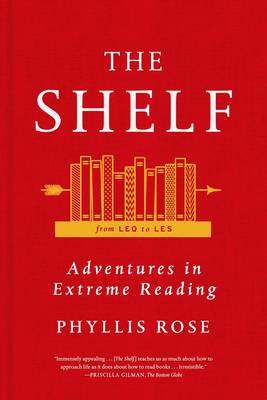
Can you have an Extreme Adventure in a library? Phyllis Rose casts herself into the wilds of an Upper East Side lending library in an effort to do just that. Hoping to explore the "real ground of literature," she reads her way through a somewhat randomly chosen shelf of fiction, from LEQ to LES. The shelf has everything Rose could wish for - a classic she has not read, a remarkable variety of authors, and a range of literary styles. The early nineteenth century Russian classic A Hero of Our Time by Mikhail Lermontov is spine with The Phantom of the Opera by Gaston Leroux. Stories of French Canadian farmers sit beside those about aristocratic Austrians. California detective novels about a picaresque novel from the seventeenth century. There are several novels by a wonderful, funny, contemporary novelist who has turned to raising dogs because of the tepid response to her work. In The Shelf, Rose investigates the books on her shelf with exuberance, candor, and wit while pondering the many questions her experiment raises and measuring her discoveries against her own inner shelf - those texts that accompany us through life.
"Fairly sure that no one in the history of the world has read exactly this series of novels," she sustains a sense of excitement as she creates a refreshingly original and generous portrait of the literary enterprise.
My 3.5 stars is a little bit misleading; this is a very well written, really interesting collection of literary criticism and based on that I'd recommend it highly.
But I dinged it a full star because the stated premise of the book is that Rose chooses a shelf at her library and vows to read all of what's on it, for better or worse. This is what I wanted to read about; I was in awe of the bravery I saw in choosing to read a random shelf of books and I expected to share that experience with her.
Right from the start my enthusiasm dimmed; she started creating rules, and coming up with caveats. I'll concede that some of them made sense: she had to choose a shelf that didn't contain all the work of one or two very prolific authors. Of course, that makes sense. But some of her 'rules' felt like she was gaming the system: they had to have a mix of contemporary and classic and had to contain one classic she's always wanted to read. I started to feel this project was rather less random and therefore the outcome more controlled.
Then she mentions at the start of chapter 4 that she isn't going to include any of the books that she didn't enjoy, asking "what was in it for either of us, me or you?". Um, well, quite a lot actually. I'm not asking that Rose tear a strip off the authors' of books she didn't like, but if you're going to do a project, do it properly. To only include the ones she liked is to do the job half-assed.
Midway through chapter 5 I almost stopped reading entirely because she goes completely off the reservation and stars discussing feminism and the bias against female authors. She makes very good points, does so rationally and thoughtfully and backs up those points with pertinent examples. She sells it.
Unfortunately that's not what I was buying when I bought this book. I signed up for a shelf reading project and I very much didn't appreciate the diversion. If I'd wanted to read about the bad rap women are getting in publishing and in literary criticism, I'd have bought that book, not this one. Additionally as fascinating as I found chapter 8 on how libraries deaccession books (and I did, truly, find it fascinating), it was completely off-topic to the matter at hand.
Once I adjusted my expectations and accepted that this was only sort of the project that inspired my awe, I could better appreciate what she was writing. When she did discuss the books she read, she did it in a way that made me feel like I experienced the spirit of the book itself. I wasn't going to get what I wanted but I did enjoy what I got.
I recommend it to anyone who enjoys literary criticism; so long as you go into it with the knowledge that the author's project is a loose construct for the book itself, it's a winner.
Reading updates
-
Started reading
-
28 December, 2016:
Finished reading
-
28 December, 2016:
Reviewed
